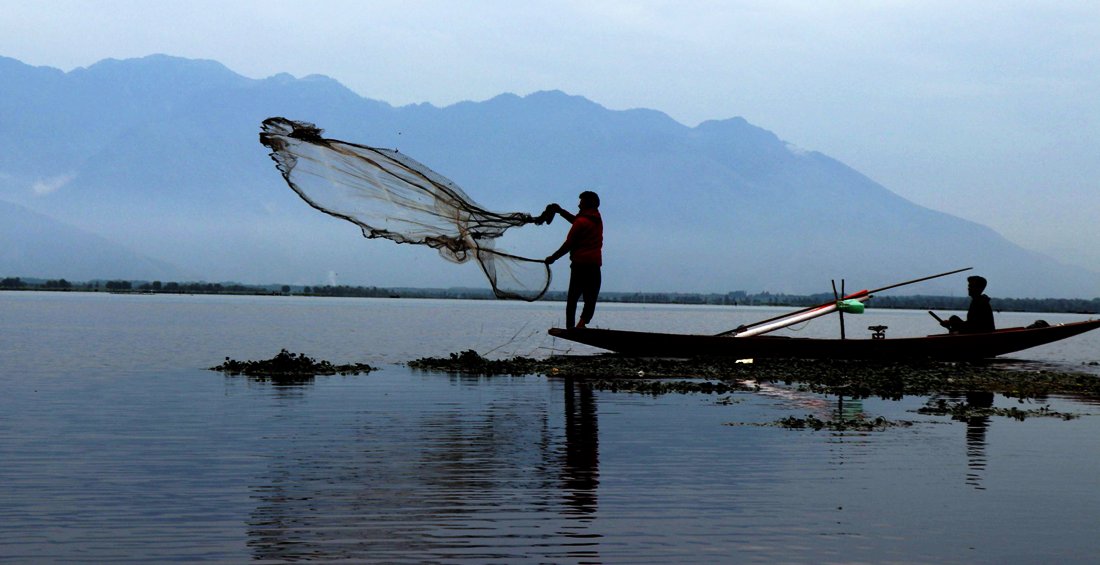[ad_1]
They may all be boatmen but they have a lot of divisions dictated by the services they deliver and the professions they adopt. Insha Shirazi reports about the newer challenges to the people living in Dal lake
“Houseboats were founded at the end of the eighties by Colonel R Sartorius, vc; and Sir H Harvey, Bart, and Martyn Kennard, I think, owned the first two crafts,” Lt Col Joshua Duke, the British Residency surgeon in Srinagar for many years, wrote in 1900. “Mr Kennard’s boat cost a great deal of money and is still on the river.”
Duke’s series of guidebooks, a huge collection of graphic descriptions of the nineteenth and twentieth-century Kashmir, however, acknowledges the fact that the boats existed in Kashmir prior to the intervention as well. “Since then they have multiplied in variety, shape, size, cost, etc, to a certain extent they take the place of houses, still very deficient in Srinagar.” The Doonga boat, however, existed.
Those were the days when the boatmen (Heanz) were the key drivers of life. They were the main transporters within the twin Kashmir lakes and managed most of the cargo between South and North Kashmir. Movement within Srinagar was only because of them. Given this advantage over others, they were close to any visitor that came to Kashmir. Most of the Kashmir travelogues are based on their interaction with the boatmen.
Divisions
Since then, diversity among the boatmen existed. There were different types of boatmen and that sub-division still exists. The divisions are based strictly on the type of professions the particular family was engaged with.

Fisherman: These are the Gadeh–haenz’s whose main source of income is fishing. They live within and around the lake of Dal and Wular. Their men catch fish and their women sell it in the market.
Lotus Growers: They are called Gaer Haenz. These people are primarily farmers who grow Lotus and chestnuts. Though both grow naturally, they harvest the nadroo (Nilumbium) and the chestnut and market them. Water chestnuts mostly grow in Wular. Some of them, off late, have lost their access to water areas where the plant grows rendering them jobless. Now, they work for others during harvesting. Lotus stem apart, they also harvest green and black trapa, fodder, and other plants.
Vegetable Growers: In their own parlance, they are known as demb-heanz. They are the main cultivators of the Dal lake and most of the vegetables marketed in Srinagar city come from them.
Boatmen: Despite the fact that Doonga’s no longer exist but a major section of the boatmen who own houseboats and shikara taxis are locally known as Dungeh haenz. They offer accommodation to tourists in their luxurious houseboats and have decent careers doing so. This category of boatmen is the most advanced and economically sound. They are cosmopolitan in nature as they have relations across the world. Some of them have retained their houseboats and are living in plush homes. A number of them, now own good hotels as well.
Hunters: Though they do not exist, there has been a sub-group called Ayer-heanz, who made a living by hunting. It is said they used to live in or around forests.
Transporters: Kashmir’s transportation and cargo were managed by horsemen or boatmen. Boatmen who owned huge barges for moving cargo were locally known as Bahatsi–heanz. Interestingly, the section of these transporters who were transporting timber was called Mata-heanz.
Challenges
All these people have been under pressure for one or the other reason. The last 100 years saw the complete disappearance of the transportation dungas as the roads were built even within the Dal Lake. Hundreds of families were relocated off the lake under the Dal restoration plan. They have homes far away from the ecosystem they were brought up in.
Now, newer tensions have cropped up. “I have been running a Shikara boat in the Dal Lake for 40 years. I pick up customers from various ghats to the houseboats,” Ghulam Rasool said. “Our boats have problems but we are not being permitted to repair them.”
Official records suggest there were 1103 houseboats and Dunga boats in 2000 and 157 of them were decommissioned in 2007-08, reducing their number to 910. With repairs being denied the numbers will go down further as fires and routine wear and tear are taking their toll. Insiders in the lake said the number of working houseboats could be much lower as no new houseboat was built in the last more than two decades.
Tariq Ahmad Pingloo a houseboat owner in Dal Lake said they have been squeezed into the lake. “It is rare to see hanjis in the Jhelum River. Quite a few houseboats are left in the river now,” he asserted.
Caught in Kashmir’s age-old peculiar casteism – that sees them as a clan apart, the boatmen are regretting a peculiar stereotyping of the community. “We are being accused of polluting the lakes,” Tariq said. “Why do not people understand the fact that the lake is our universe and we cannot pollute it because it is linked to our survival?” The government has gone to court, more than once, accusing the community living in the lake of polluting the water body. This is the key factor for rejecting the repair request by owners.
[ad_2]
#Clan #Crisis
( With inputs from : kashmirlife.net )

Leave a Reply